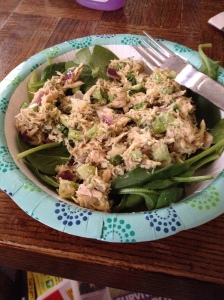I can always think of a million reasons not to cook dinner (or breakfast or lunch). It’s inconvenient, expensive, messy, time-consuming, not immediate, my kitchen is a horribly unpleasant place, etc. The list could go on for a long time. And while my cooking environment isn’t likely to improve anytime soon (seriously, my kitchen is the worst – there is no food prep space, no storage space and most of the food isn’t even in the kitchen because there’s nowhere to put it), I have learned how to work around most of my other excuses. Because if I didn’t, I’d be eating a steady diet of granola bars, lean cuisine and take out, and, at least for me, that’s no way to get healthy. So, here are my tips and mental tricks for getting into the kitchen, away from the takeout, and ensuring that I eat 3 healthy homemade meals most days:
1. Practice makes perfect. OK, I’m not perfect at preparing food. I make a big mess and things like chopping vegetables often take a lot longer than they should. But, the more frequently I do it, the better I get. My knife skills come more easily. I make less of a mess (well, that depends on what I’m cooking, but at least I remember to keep the trash can nearby instead of having to make 10+ trips into the dining room where it normally lives). By cooking more often, I’ve become more efficient at preparing food and that really helps both at mealtime and when it comes to motivating myself to prepare things in advance.
2. Prepare/cook once to eat twice (or three or four times). If I had to make a distinct, freshly prepared meal three times a day, seven days a week, I’d probably go crazy. And almost certainly I wouldn’t do it. Leftovers are lifesavers (and wallet savers). For example, today’s lunch. I could have made one serving of tuna salad using one little pouch of tuna, chopping one piece of celery, a tiny bit of onion, pepper, etc. And I suppose I could do that that every day, chopping additional vegetables every day. Or, I could do what I did this morning and use a large can/pouch of tuna (12-18 ounces), chop a whole onion, a few pieces of celery and some peppers and make enough today to eat today and for my next two or three lunches. The amount of work is really the same – in fact it might even be easier to chop a whole onion than it is to chop just enough for one serving, not to mention less wasteful – and it means that tomorrow and Wednesday, I can just pull out that tuna salad, adjust the seasonings if necessary, and throw it on a bed of spinach or some avocado. I can make it a little different, so that it’s not the same exact meal as it was today, but I don’t have to cook again! Same goes with dinners, obviously. And I even do this with a number of different breakfast foods, including oatmeal and smoothies. The biggest hurdle for me, here, is to find the balance between having the right amount of leftovers that will actually get eaten while not getting sick of eating the same thing for multiple days. I find that if I stagger my preparation of lunches and dinners so that at least one of those meals is something that I didn’t eat the day before, I’m usually pretty good. It also helps that I have someone to help me eat my leftovers.
3. Make food prep as easy as possible. This one might mean different things for different people. For me, it means that sometimes, I buy vegetables that are already chopped. Cutting up an acorn squash can be a big pain in the butt – sometimes it’s easier to just buy it already cut. On rare occasions, I’ll even buy chopped onions Yes, it costs more that way, and I have a very sensitive budget. But sometimes it’s worth the couple of dollars to know that I’m going to actually prepare and eat what I planned on preparing and eating, rather than getting lazy and eating out and wasting the food that I bought to cook.
4. Stock the freezer. This kind of goes along with number 2, but it’s also different. When I’m making soup or other freeze-able meals, I generally put about half of the recipe in single serve containers in my freezer before I even eat a serving (depending on the recipe, I may double it and freeze half or I may just freeze some of the servings of the original recipe). Not only does this help ensure that I have healthy options when I don’t have time or ingredients to cook, but it also helps to moderate the quantity of leftovers that I have to eat within any given time and keeps me from getting bored.
How do you make it easier to ensure that you’re eating healthy, homemade meals (at least most of the time)? Are there other things I should be doing? Shortcuts I’m missing?

